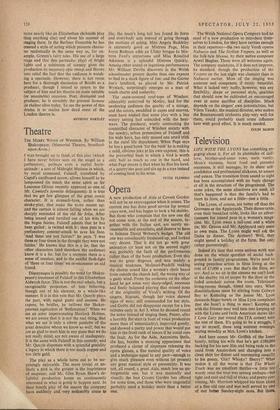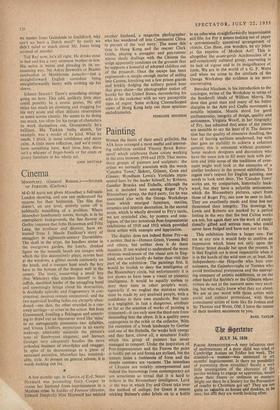Television
LIFE WITH THE LYONS has something en- gaging about it. For all its platitudes of calf- love, brother-and-sister rows, male vanity. Mom's niceness, burnt food and parental meanness, it still manages, by its sheer self- confidence and professional slickness, to amuse and amaze. The transition from sound to sight has been accomplished with no basic change at all in the structure of the programme. The same jokes, the. same situations are used; all that's happened is that the family's had to learn its lines, and act a little—just a little.
The Lyons, of course, are better of than the Groveses or the Appleyards. Their dinner table, even their breakfast table, looks like an adver- tisement for tinned peas in a woman's maga- zine. Mr. Lyon owns a tail-coat and a white tie; Mr. Groves and Mr. Appleyard only seem to own macs. The Lyons might well ask the Dales to dinner. The Archers? Well, they might spend a holiday at the farm. But only rather patronisingly.
Indeed it's time that some serious work was done on the whole question of social back- ground in family programmes. We're used to seeing penniless artists in films living at the rate of £5,000 a year. But that's the films, we say. And as we sit in the cinema we can't look at the shabby bit of carpet by the door or the faded armchair across the room. Television living-rooms though, blend into ours. What dissatisfactions must be stirring from Colwyn Bay to Kettering as the junior Mr. Lyon demands finger-bowls or Miss Lyon complains that she hasn't a thing to wear! Keeping up with the Joncses may well turn into keeping up with the Lyons and (with American shows like I Love Lucy just round the ITA corner) with the rest of them. It's going to be a struggle, say to myself, these long summer evenings, staring moodily at Mrs. Lyon's kitchen.
And here comes Mr. Griffith of the Jones family, telling his wife that he's got £180,000 backing for his new film and being rude to the maid from Amsterdam and changing into a clean shirt for dinner and murmuring casually to his guests, 'Gin? Whisky? Sherry?' What makes it all the worse is that The Whole Truth was an excellent thriller—a little too wordy once the trap was sprung perhaps—but tight and neat and full of tricks; and pretty con- vincing. Mr. Harrison whipped his team along at a fine old rate and was well served by one of our better Sunday-night casts. But there.
we mutter from Galashiels to Guildford, why can't we have a Dutch maid? So really we didn't mind so much about Mr. Jones being accused of murder.
Te-d Ray now, he's all right. He drinks stout in bed and has a very common brother-in-law. His series is warm and pleasing in its un- assuming way. No Askey fireworks or Braden cerebration or Monkhousc panache—just a straightforward English comedian being straightforwardly funny with nothing up his sleeve.
Johnny Morris? There's something strange going on here. This odd, unlikely little man could possibly be a comic genius. He still relies too much on clowning and mugging for his very acute and often delicate observation to come across cleanly. He seems to be doing too much, too often for his range of characters to work themselves out. Occasionally he's brilliant. His Turkish baths sketch, for example, was a model of its kind. What he needs, I think, is more confidence and more calm. A little more reflection, and we'd really have something here. And bless him, there isn't a whisper of finger-bowls or fur coats or glossy furniture in his whole act.
JOHN METCALF



















































 Previous page
Previous page